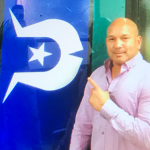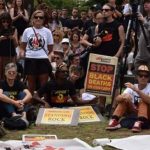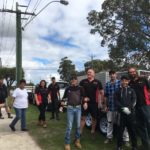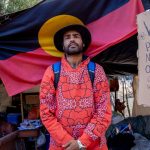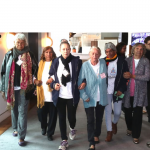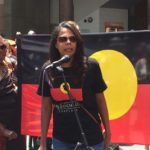In Solidarity With First Nations: An Interview With the Anticolonial Asian Alliance
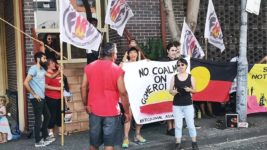
Something is rotten in the state of Australia. And it’s a long-term collective denial that Anglo Australians have lived by, which started when the first British ships arrived and has subsequently been passed down through the generations.
It’s the belief in terra nullius: that the continent was vacant when Britain began its takeover. This legal fiction was asserted as the justification for the requisition. Yet, the issue was there were already around 500 First Nations established on this island in the late eighteenth century.
The British were dab hands at colonising the lands of other people. These gentrified, tea-drinking colonialists were well-versed in moving into territories and brutalising, enslaving, incarcerating and killing the original inhabitants.
And this is exactly what was done in this country. Aboriginal and Torres Strait Islander land was stolen, while it was simultaneously claimed that First Nations people didn’t exist. And as the decades ticked over, Anglos taught that the poverty and criminalisation of First Peoples was their own fault.
For the crime of existing
Three weeks ago, two armed police entered the house of Warlpiri teenager Kumanjayi Walker and allegedly gunned the unarmed 19-year-old down. One police officer has been charged with murder, which is the first time an officer has ever received such a charge in relation to an Aboriginal person.
This is the same violence that’s marked the settler colonial society since its inception. Kumanjayi’s death in the remote Aboriginal community of Yuendumu is no different from those who were killed in the first days of the occupation.
Yuendumu elders have called on white authorities to stop patrolling their town with guns. But, Australian authorities have responded by sending in special police counterterrorism units to Central Desert communities.
Meanwhile, the lands First Peoples have conserved for tens of hundreds of years are burning, while in some parts, the water has run completely dry. And the people who hold the knowledge as to how to preserve these ecosystems, are either ignored or locked away in prison.
The white Australia problem
In so-called Australia, Anglocentric racism is in no way simply confined to Indigenous people. Indeed, within white culture there’s the concept of “it’s their turn”, which means when new groups of migrants come to this continent it’s somehow legitimate to subject them to racial abuse.
Of late, we’ve witnessed ongoing Islamophobic violence, which at its most extreme saw an Australian shoot dozens of Muslim worshipers in Christchurch. But prior to this, various Asian communities bore the brunt of the illogical hatred that good old “Aussies” have bred into them.
These days, a group called the Anticolonial Asian Alliance (AAA) has formed in solidarity with the First Nations peoples of the land. Sydney Criminal Lawyers spoke with an AAA spokesperson about the need to stand tall against this same colonialism that once ravaged many of their own countries.
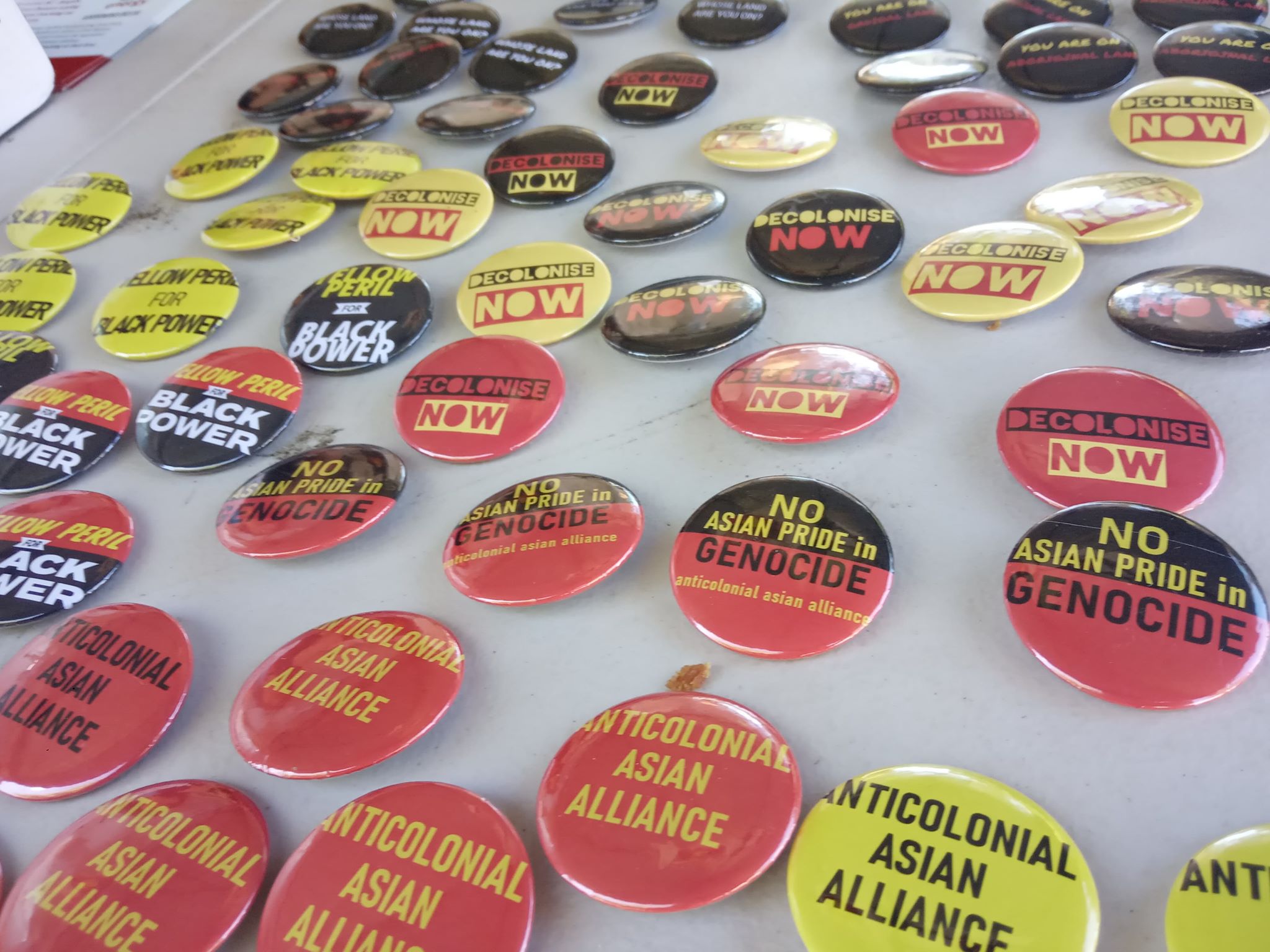
Firstly, the Anticolonial Asian Alliance is an organisation committed to supporting the struggle of First Nations peoples. But, many in the broader Australian community might assert that colonialism is something of the past and is no longer an issue.
How would AAA respond to such claims? And why is it important to keep up the struggle?
AAA asserts that colonialism is ongoing. Sovereignty on the lands that have been branded internationally as “Australia” have never been ceded. Since invasion, there has been a holistic genocide of First Nations peoples.
This is seen in the significantly lower life expectancy of Aboriginal and Torres Strait Islander peoples, the high rates of child removals, the ongoing high rate of Aboriginal deaths in custody, as well as the fact that an illegitimate government still maintains control over sovereign unceded lands, with very limited and controlled mechanisms for Indigenous peoples to contest this control.
There have been over 420 Aboriginal deaths in custody since 1991. What would you say this tells us about the relationship between Australian authorities and First Nations peoples?
Police, incarceration and surveillance have always been at the core of the settler colony since so-called Australia was first established as a penal colony. This is from prisons and missions to the current racist foster care system and child removals.
The huge rates of Aboriginal deaths in custody reveal the ongoing colonial nature of the “justice system”, which continually dehumanises Aboriginal people and upholds the settler colony.
While AAA believes in the abolition of police as an institution, the lack of any reform beyond empty recommendations following coronial inquests into Aboriginal deaths in custody highlight that these channels serve as smokescreens.
We support organisations such as GMAR, ISJA, Shut Youth Prisons Mparntwe and Strong Grandmothers of the Central Desert Region in their fights to hold the state accountable for these acts of violence, as well as strengthen community bonds for Aboriginal people.
And what are some other the other issues AAA asserts are important to focus on when it comes the plight of Aboriginal and Torres Strait Islander peoples?
First Nations sovereignty and the right to self-determination cannot be separated from any other issue.
We’ve seen a huge growth in the climate change movement in recent times, and yet there seems to be a lack of acknowledgement that the very system that has caused this catastrophic damage to the environment, is the same system exported by white colonialists globally.
First Nations peoples across the world have been tending the lands for thousands, and sometimes tens of thousands of years, such as is the case on the lands we stand on currently.
Every issue that’s being fought for on these lands require having First Nations voices to the front.
Right now, NSW and Queensland have been on fire for a fortnight, and this has spread to Victoria and South Australia.
These events are linked to the climate crisis. And this has been caused by western imposed industrialisation, which is at odds with Indigenous ways of being.
But, as this is happening, Australian politicians have been quick to silence the community in making the connection between human caused climate change and these catastrophes.
What’s your take on how the Morrison government, along with various state governments, are dealing with the climate crisis that the broader Australian community is increasingly becoming concerned over?
The Morrison government is simply not dealing with it. Scott Morrison’s recent threats to take action against climate justice protestors – in response to Blockade IMARC – illustrate that the government is not only willing to side with the ecological devastation wrought by the extractive industries, but to additionally criminalise people who are actively fighting to end these injustices.
This follows Queensland premier Anastasia Palaszczuk’s recent rushed legislative crackdown on climate protesters, which concerningly increases police search and seizure powers.
Further, while these changes have been introduced to counter climate protesters, it’s not difficult to imagine that these laws and others will end up disproportionately targeting other anti-status quo movements, including Indigenous sovereignty protests.
However, it’s maintained that every state party upholds the legitimacy of an illegitimate government.
There’s also the issue of rising white nationalism in Australia, which is often said to be stoked by parliamentarians.
Today, the main targets of this prejudice are Muslim communities, but not so long ago, it took direct aim at Asian communities.
How does the AAA see that this rising prejudice should be dealt with? And what do you think about the widespread idea of passing this racism off as “it’s just their turn” in reference to which community it’s aimed at?
Firstly, it’s important to recognise that many Asian communities are also predominantly Muslim.
We can’t ignore the fact that so-called Australia’s detention of refugees and asylum seekers is a deliberate extension of the colonial criminal justice system, and that predominantly Muslims are targeted by border forces.
This is a direct result of white nationalist sentiments pushed by the government and perpetuated by “grassroots” nationalist groups.
We have to strengthen our communities by educating our friends and families about the very real threat of white nationalism in our own neighbourhoods.
Besides, even suggesting that exposure to racism in this country is just a matter of “turn-taking” is a really clear indication of just how deeply entrenched racism is here – we normalise it as if it should happen. This is not okay.
The Anticolonial Asian Alliance has come to the fore over recent years. Why was it important to form an activist group that was Asian in makeup?
AAA formed largely out of frustration and disillusionment with other organising spaces and norms “on the left”: that felt too white, too masculine, too liberal, too secular, too abstract. And a desire to build stronger networks of solidarity with First Nations people.
Even though “Asianness” was one of the common lines that brought us together in the beginning, many of us ended up here through other forms of solidarity and community, and so we have always held a strategic distance with this identity.
In any case, we reject the traditional Asian settler identity that has been imposed upon us and are committed to solidarity with this continent’s First Nations people.
We seek to disrupt narratives of how an “Asian” should look and behave. And we take it as our privilege to unsettle the term from within.
In particular, East Asians, as well as South East and South Asians are often prescribed the identity of “model minority” – a tool with which the white settler colony is able to dictate “acceptable” ways of existing as an “other”, thus weaponising this division against largely Black and First Nations communities and hindering the possibility of anticolonial solidarity.
Asian settler communities are invited by the white settler colony to participate in the ongoing dispossession of Indigenous peoples.
However, many of us have come from lineages of resistance against colonial and imperial forces on our own lands, and so we maintain our commitment to these decolonial horizons.
Many of us draw upon the wisdom of our ancestors, and together we value collectively, empathy, loving engagement, and intergenerational healing.
We refuse the imposed colonial history and white narrative of progress and instead direct our efforts to recognising the continued reality of sovereignty, and we strive to practice this in our solidarity with First Nations people here.
And lastly, back to the Morrison regime. We’ve recently re-elected a government that’s climate change denying, overtly racist and redundant when it comes to First Nations issues.
What’s the AAA’s take on the Morrison government in regard to how it’s responding to what’s important to the constituency? And how do you explain a country that on the ground is highly multicultural and diverse in nature, having a government like this in office?
As mentioned, we join and follow countless others in recognising the ongoing existence and reality of sovereignty, which has – for over 230 years now – been refused and unsettling the false legitimacy of this or any settler colonial government.
Morrison is just the latest in a line of leaders who rule ultimately for and from the depraved interests of a privileged few. And while he might be one of the more explicit and egregious expressions of the inadequacy of these institutions, he is really no different from so many before him.
It could be said that there are past leaders to thank for the relative ease with which we and so many other migrants can enter and move about this place, but we must always recognise the true hosts and navigate our relations accordingly.
Certainly, if there are any hosts with whom we ought to feel a kind of compassionate and grateful responsibility to, it’s not Morrison or anyone in parliament.
And looking around at how the people and the land is feeling right now, it seems quite self-evident that too many are not living in healthy alignment with themselves or each other or this place.
We cannot expect anything resembling genuine leadership from someone whose interests are always going to be more aligned with profits over people.


